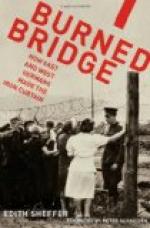The last stretch and this last day had tried his soul to its utmost. Pachugan lay near the end of the water route. What few miles he had to travel beyond the post would lie along the lake shore, and the lake reassured him with its smiling calm. Having never seen it harried by fierce winds, pounding the beaches with curling waves, he could not visualize it as other than it was now, glassy smooth, languid, inviting. Over the last twenty miles of the river his guides had strained a point now and then, just to see their passenger gasp. They would never have another chance and it was rare sport, just as it is rare sport for spirited youths to snowball a passer-by who does not take kindly to their pastime.
In addition to these nerve-disturbing factors Thompson suffered from the heat. A perverted dignity, nurtured in a hard-shell, middle-class environment, prevented him from stripping to his undershirt. The sun’s rays, diffusing abnormal heat through the atmosphere, reflected piercingly upward from the water, had played havoc with him. His first act upon landing was to seat himself upon a flat-topped boulder and dab tenderly at his smarting face while his men hauled up the canoe. That in itself was a measure of his inefficiency, as inefficiency is measured in the North. The Chief Factor of a district large enough to embrace a European kingdom, traveling in state from post to post, would not have been above lending a hand to haul the canoe clear. Thompson had come to this terra incognita to preach and pray, to save men’s souls. So far it had not occurred to him that aught else might be required of a man before he could command a respectful hearing.
Back from the beach, in a clearing hacked out of the woods, stood a score or more of low cabins flanking a building more ambitious in scope and structure. More than a century had passed since the first foundation logs were laid in the name of the Hudson’s Bay Company, to the Company’s glory and profit. It had been a fort then, in all that the name implies throughout the fur country. It had boasted a stockade, a brass cannon which commanded the great gates that swung open to friendly strangers and were closed sharply to potential foes. But the last remnant of Pachugan’s glory had gone glimmering down the corridors of time. The Company was still as strong, stronger even in power more sure and subtle than ever lay in armed retainers and absolute monopoly. But Fort Pachugan had become a mere collecting station for the lesser furs, a distributing center for trade goods to native trappers. There were no more hostile tribes. The Company no longer dealt out the high justice, the middle, and the low. The stockade and the brass cannon were traditions. Pachugan sprawled on the bank of the lake, open to all comers, a dimming landmark of the old days.




